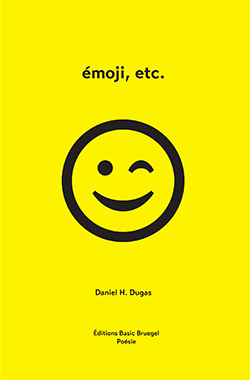Musings During a Time of Pandemic (2021)

Three of my texts, Assumptions and Axioms, Communicating Vessels, and Snapshot, have been included in the Musings During a Time of Pandemic: A World Anthology of Poems on COVID-19.
About the book
For those who have gone before us, the dead, those swept away by the flapping wings of the bat, we wish them well in their travel! and, in their sojourn in the cleansing waters of purgatory, let their flawless spirits, independent of the stains of mundane effects of wrongdoing, attain purification and the rewards of the divine abode, a garden of delights; let no torture or torment be subjected upon them, oh, poor souls!, spare them, O God of mercy! since while on earth, they never offended anyone. In their departure from purgatory, let them move on in solemn silence, and acquire wings that will fly them to a watershed, a peaceful spot somewhere beyond the blue; therein, then, in their final dwelling, rest in eternal peace… and we, who are left behind, who are not any better than them, we who are immortalized in ash and dust, although stained with tears, let’s bond in a spirit of humility and kindness and strive as one human race to rock the world with our messages of hope, love and peace.
About The Compiler/Editor:
Christopher Okemwa is a literature lecturer at Kisii University, Kenya. He has a Ph.D. in performance poetry from Moi University, Kenya. He is the founder and current director of Kistrech International Poetry festival in Kenya (www.kistrechpoetry.org). His novella, Sabina and the Mystery of the Ogre, won the Canadian Burt Award for African Literature in 2015. He has written eight books of poetry and been translated to Armenian, Chinese, Greek, Norwegian, Finnish, Hungarian, Arabic, Polish, Chinese, Nepalese, Turkish, Spanish, Catalan and Serbian. He has also translated four literary works of international poets from English to Swahili. He is the editor of four poetry anthologies from around the world. He is the author of ten folktales of the Abagusii people of Kenya, three children’s storybooks, one play, two novels and four oral literature textbooks. Website: www.okemwa.co.ke
Copyright © 2020 Christopher Okemwa and all the authors herein.
All rights reserved.
This publication may not be reproduced, in whole or in part, by any means including photocopying or any information storage or retrieval system, without the specific and prior written permission of the author and publisher, except in the case of brief quotations embodied in critical reviews and certain other non-commercial uses permitted by copyright law. This book is sold subject to the condition that it shall not, by way of trade or otherwise, be re-sold, hired out, or otherwise circulated without the author’s or publisher’s prior consent in any form of binding or cover other than that in which it is published and without a similar condition including this condition being imposed on the subsequent purchaser.
For permission requests, email the publisher at the address below.
Published by Kistrech Theatre International (www.kistrechpoetry.org)
ISBN: 978-9966-955-95-1
First Edition: November 2020
Published by Kistrech Theatre International (www.kistrechpoetry.org)
P.O. Box 3956, Kisii, Kenya.
Printed in Kenya
Ordering information:
WhatsApp: +254-723-868167
E-mail: festival@kistrechpoetry.org
E-Mail: cokemwa08@gmail.com, chris@okemwa.co.ke
Website: www.kistrechpoetry.org
Website: www.okemwa.co.ke
This anthology has been sponsored by Dr. Christopher Okemwa
Atticus Review (2017)
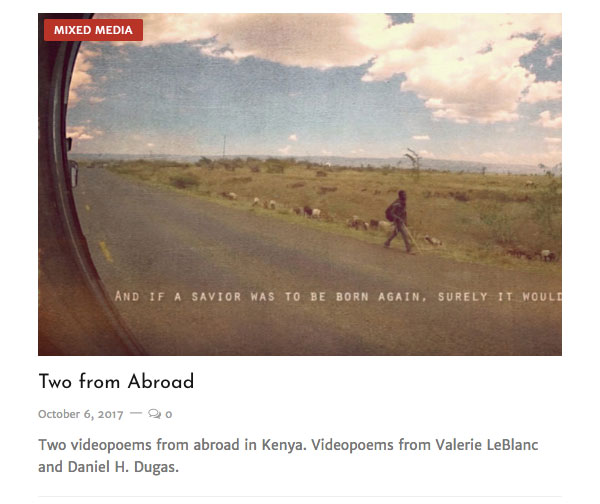
Matt Mullins from the Atticus Review just published a piece on Valerie LeBlanc’s Land of Shepherds and my video In Kisii. For more info: https://atticusreview.org/two-from-abroad/
Atticus Review is a daily online journal that publishes fiction, flash, poems, creative nonfiction, video, music, book reviews, cartoons, animation, and whatever else we find worthy of eyes.
IN KISII (2016)
In Kisii is a poetic voyage through Kisii town, Kenya. From the still image of a truck stopped on the curbside of the bustling city, images from three moments in time rise to the surface.
This video was realized following participation in the Kistrech Poetry Festival.
Notes from the 4th Kistrech Poetry Festival (2016)
I have participated in many poetry festivals, each series of events is unique, but the fourth Kistrech Poetry Festival had something that others don’t have. To begin, there are not many venues for international poets or artists in Africa, the economic realities of the continent dictate this scarcity of opportunities. Christopher Okemwa, the director of the festival has been working hard to create an event where the audience and the poets can share insights and discussions. Another thing that made this festival standout was the fact that our group, the invited poets and a large section of the audience, were always together. We were together in the conference room, at lunch breaks and we were together in buses travelling to different locations. This created a sense of belonging and gave us a chance to get to know each other more closely.
Most of the Festival events took place at the main campus of the Kisii University from October 3rd until October 8th with writers from Nigeria, the USA, Denmark, Netherlands, Norway, Canada, and Kenya. Student participants came from both Kisii University and Nairobi University. A series of readings by internationally based, Kenyan poets as well as student poets took place on the Kisii University Campus, at the Genesis Preparatory School, the St. Charles Kabeo High School and on the shores of Lake Victoria. In addition to these, papers were also presented: Beatrice Ekesa (Nairobi University) talked about issues of globalization in the context of Spoken Word in Kenya; Martin Glaz Serup (Denmark) presented the Holocaust Museum, a conceptual post-productive witness literature that deals with the representation of Holocaust; Eric Francis Tinsay Valles (Singapore) delivered a text about trauma in poetry; Seth Michelson (USA) talked about the process of translation and the practice of human freedom; Micheal Oyoo Weche (Kenya) spoke of oral poetry and aesthetic communication practiced by children within the Luo tribe; Tony Mochama (Kenya) discussed the modernity of African poetry in Kenya; Godspower Oboido (Nigeria) compared Nigerian poet Christopher Okigbo with Russian poet Alexander Pushkin; Margaret N. Barasa (Kenya) explained the convergence of language and culture in Manguliechi’s Babuksu after-burial oratory and Valerie LeBlanc and myself (Canada) presented our poetic work created within the Everglades National Park biosphere.
This was the first time that the Festival was held during the University’s Cultural Week. The campus was alive with students and many attended the festival’s lectures and presentations. Throughout the festival, there was a constant flow of energy, of shaking hands, of being truly part of the whole, like the Festival’s program states.
Here are two key moments, two events that made an significant impression on me. Both happened on October 6rd 2016.
GENESIS PREPARATORY PRIMARY SCHOOL
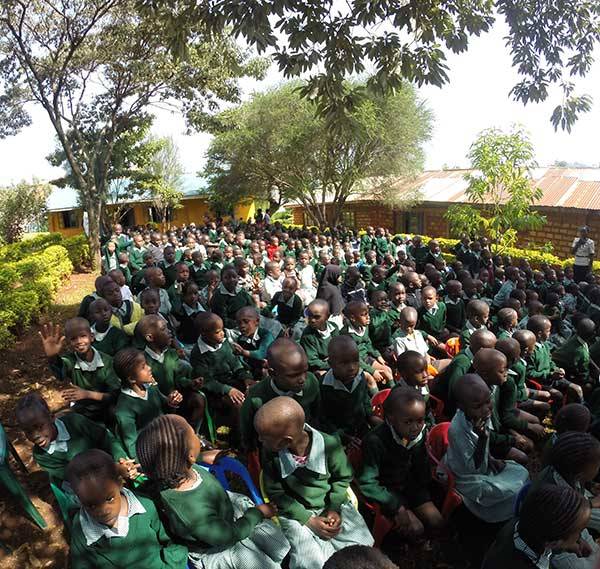
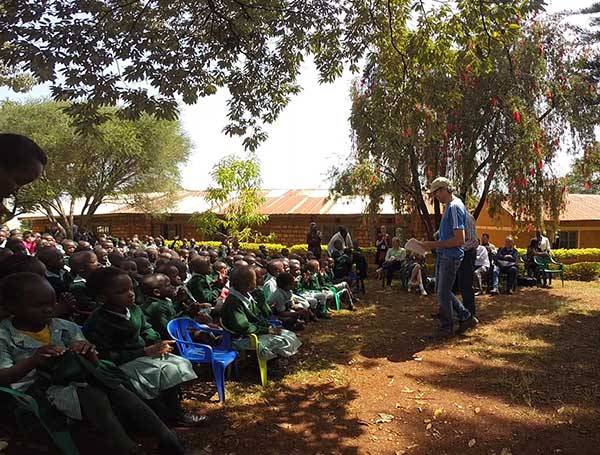
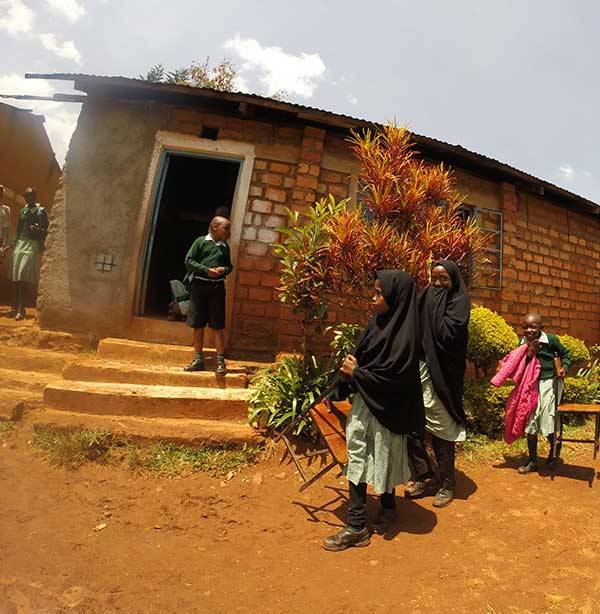
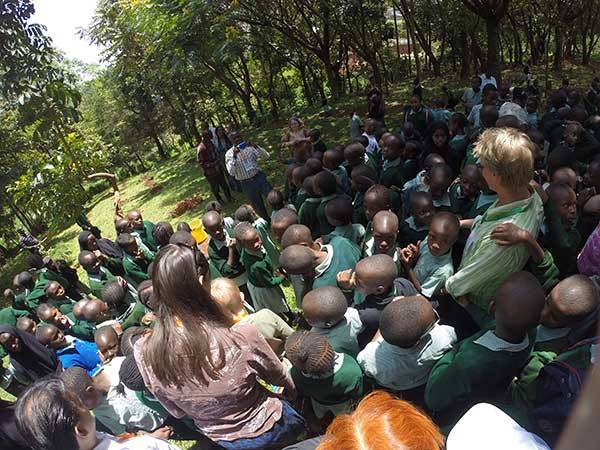
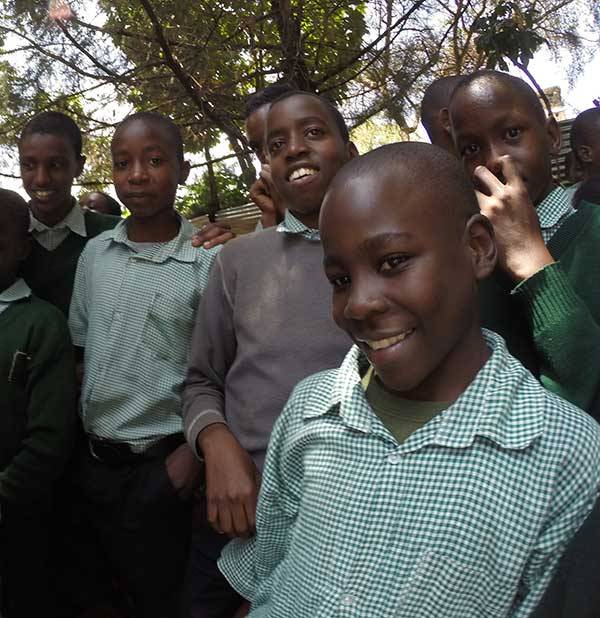
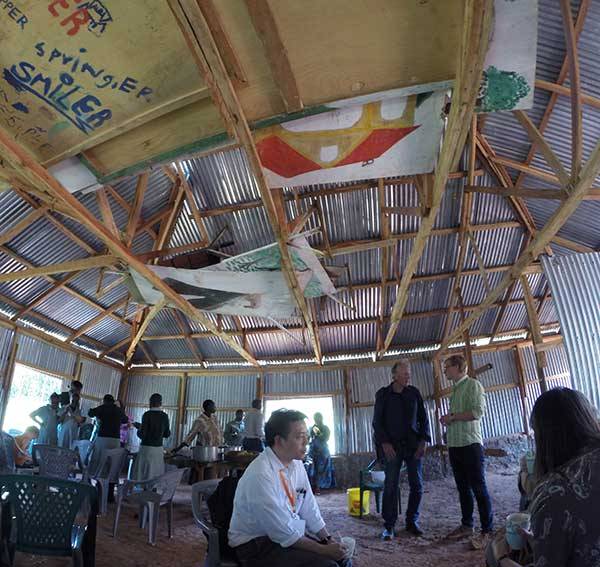
We were on our way, to the Genesis Preparatory Primary School to meet and to read to the children. As with every morning, the light was intensely beautiful; the sky blue and the sun hot. At the school, three hundred children, dressed in their dark green uniforms with green and white checker shirts were waiting for us. They actually had been waiting all year for this moment and had a program of poetry, songs and dances prepared for the occasion. We all sat outside in the courtyard under the sun and under the shades of pine trees, on blue chairs and yellow chairs, on green chairs and magenta chairs. There was electricity in the air. A teacher came up front, to welcome us and invited a group of students to take place on the stage. Many students had a chance to perform poetry and to sing. To my surprise, a lot of the songs were in French. The Principal told me later that they wanted them to learn English, Kiswahili and French as many countries in the regions speak French. After that, it was our turn to read. Gunnar Wærness (Norway) created a song for a crow that was perched in a tree above us; Martin (Denmark) read 100 words from a children’s book; Jennifer Karmin (USA) involved the children with a participative poetry reading and so on.
After the readings, we were invited to plant trees on the school grounds. Poets planting trees: ‘Poet-trees’ said someone. The holes were already dug and the little seedlings were sitting in a wheel barrel, all ready to go. As each poet was busy planting, students would gather around, looking at our techniques and cheering for the forest to come. Many of the holes were sewn with yellow flowers that looked similar to squash flowers. This seemed to present a wish to protect and encourage the future growth of the trees. The man in charge of the grounds made sure that the dirt was well packed and that the seedlings were straight. When we left it looked like a little forest had been added to the valley.
BOGIAKUMU VILLAGE
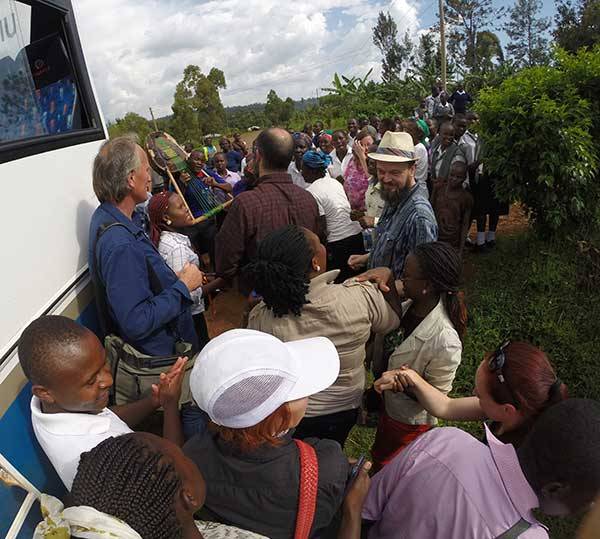
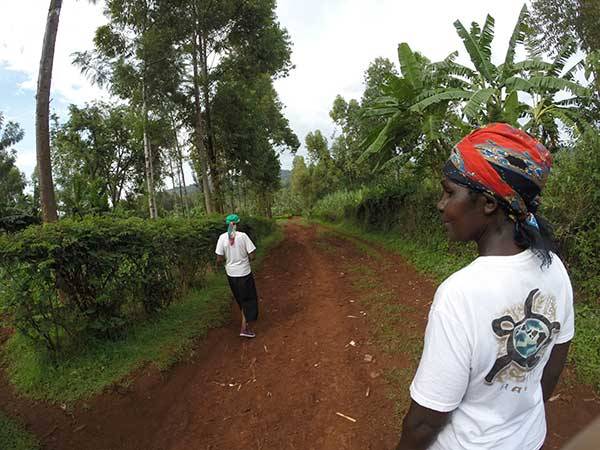

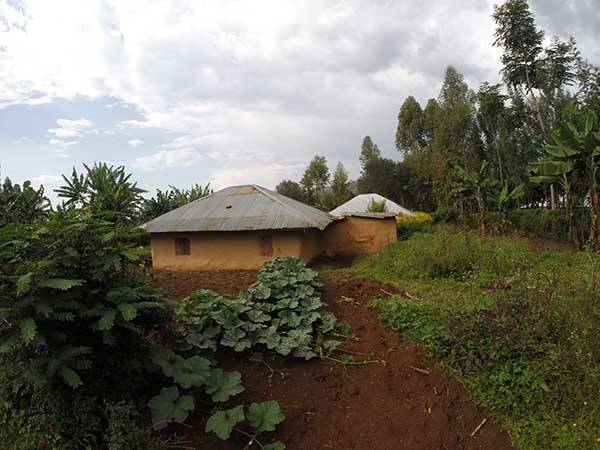
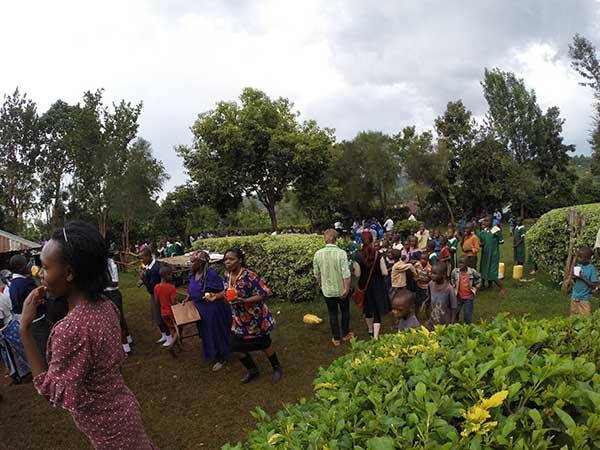
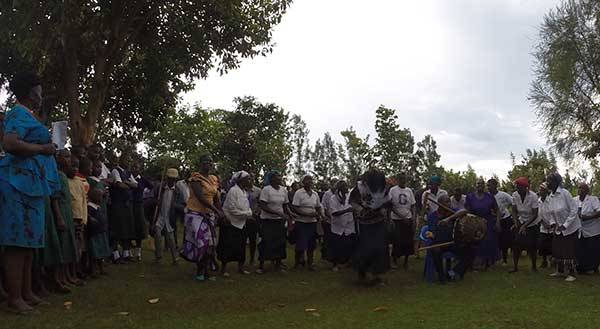
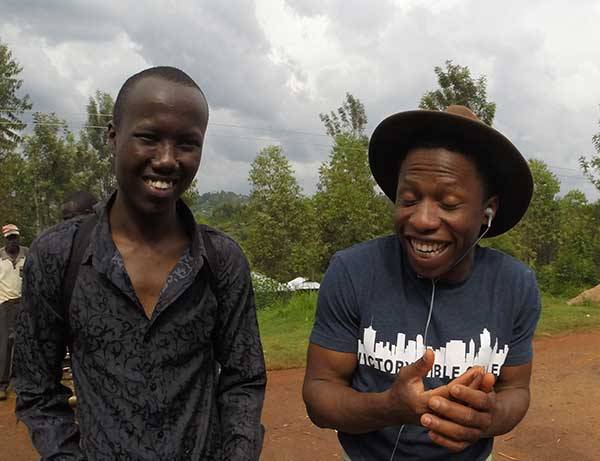
When we stepped out of the bus, I don’t think any of us expected to be greeted with such enthusiasm. A musician was already playing his nyatiti, an eight-string instrument, as loud as he could. There was a lot of laughing, clapping and dancing. In the blink of an eye, we were dancing as well, which generated even more laughter. Then, each of the poets was taken in charge by one or two villagers for a personal tour. I left with my two hostesses and Cornelius, a Kisii University student who was translating the exchanges. In Kiswahili I said ‘good morning’ to the women. They both laughed. Cornelius told me that in the afternoon, the custom is to say, ‘good afternoon.’ I wished that I had a pen and a piece of paper to add this to my list of Kiswahili phrases. I repeated it in my head a few times like a mantra as we walked on the main road until we took a path down the hill. The earth is red. Everything is lush. The air is warm and humid. The pathways are incredibly complex, there are paths going everywhere. We walk past mango trees, papaya trees, banana trees, avocado trees, sugar cane and cornfields. Here and there a goat tied to a post looks at us as we go by. Cornelius tells me that the two women are widows and are cultivating their plots and raising their animals by themselves. We finally arrive at a house. As we go in, a few little chicks scramble to get out. The air inside the house is heavy and the sunlight makes the dust appear like diamonds floating in the room. The walls are covered with a lacework-like fabric. I notice two pictures on one of the walls and go to them. They are images of two smiling men. Under the images are their names and two dates. The men are dead. They are the husbands of the two women. The oldest man was born in 1963 and the younger in 1985. The images and the frames look old, as if they had been on the wall for a long time, but the younger man died just a couple of months earlier. After a while, we pull away from the wall and sit on couches. From there I can feel the heat radiating from the tin roof. Cornelius tells me that when one of the women’s husband died, she had to wait for planting the corn and this is why hers is so short compared to the rest. There is a silence. We hear the wind rustling through the nearby sugar canes. At that moment, we also feel the absence of this husband. Then the older woman gets up and goes out. We follow her lead back onto the paths. Red soil. Corn fields. The sun feels good. We arrive at the second home. The woman opens the door. The light floods into the main room. It is very hot and very bright. We sit and rest there for a while.
I can’t remember much from this house; my mind was still filled with the other place. Then we were back on the main road. There were many young people walking to the river to get water. It looked like they just came back from school. All carried yellow jugs. The river, I am told, is not far. I asked Cornelius to teach me how to say, ‘How are you’, and then I repeat this to a group of young boys. They all laugh. Cornelius tells me that there is a difference to whether you speak to one person or many. He teaches me how to say ‘how are you’ to many people, which I say many times during the walk back to the village centre.
The weather was turning. Big dark clouds were gathering and it started to rain. Instead of eating outside, we all went inside a large house to share a meal. We had yams and uji, a porridge made from ground millet. By the meal’s end, the weather had cleared up and we were invited to go back outside. We sat on plastic chairs in a big circle. The musician was in the middle with his instrument and dancers came from behind him. Eventually, it was the poets’ turn to join in the dance. Later, as we walked back through the pathways toward the bus, we saw a rainbow arching over the valley.
KISII POSTSCRIPT
The night before we left, two women were killed by the police at the market. Some people at the hotel heard what sounded like fireworks. I heard nothing. But two women died that night. Then there was a riot and wooden stands were thrown into a bonfire as people protested. In the morning as we drove down the road, the market looked empty, here and there were piles of charred wood. A few days later, the University of Kisii introduced new fee payment rules for its students. This change resulted in a massive riot, this time by students. A fourth-year woman student was shot in the head by a stray bullet, but survived. The Daily Nation (Nairobi) newspaper, reported that 10 students had been arrested while the Standard (Nairobi), mentioned that more than 30 students were arrested. According to the newspapers, the fee collection office and a School of Law office were set ablaze. Images of soldiers on the grounds of the University were unsettling to see. Many of our young poet friends from the Kisii University and University of Nairobi (Elly Omullo, Ombui Omoke, Roberto de Khalifa) wrote poignant texts on their Facebook walls, putting words to what was happening around them.
THITIMA (energy)
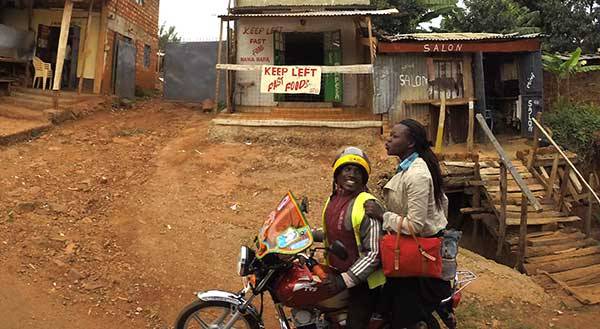
In this landscape
of shovelled earths
and un-shovelled earths
of arched goats
looking thoughtful
of speeding Boda-Bodas
and Boda-Boda sheds
In this land of Churches
and Choma zones
of men with shovels
walking empowered
dreaming of self-sufficiency
of yams and sweet potatoes and bananas
In this cosmology of paths
extending outward
shortcutting everything
In this endless network
of paths of life and death
of paths taken and abandoned
of paths like the energy of the Big Bang
like the music rising
from every bus
every stand
from the music
that envelops everyone
There is no stopping the going
and no stopping the rhythms.
A path goes this way
another one that way
they overlap
become larger
veer between bushes
They are the tentacles
of giant octopus’
dancing a waltz
The neurons
sending electricity
to each limb
light up this
East African night
The paths are
the way to go
the way to come
back home
They are
what is left
of having to go
of wanting to go
They are what is passed down
to the children who in turn
will invent new roads to travel upon
and new rhythms to walk along.
Daniel H. Dugas
October 9, 2016
GODS
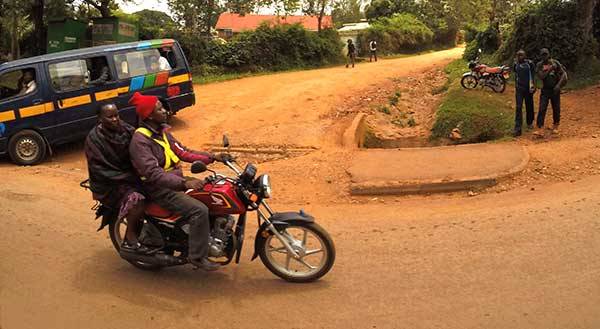
God is everywhere!
Especially as decals on buses
GOD ALMIGHTY
in bold letters
racing on a dirt road
God in the middle of the wilderness
incarnated in every speeding Boda-Boda
God is everywhere!
I see him
in the diesel fumes of buses
I see him
in the whirlpools
of papers and bags
in the tails
of small goats
eating in ditches
I see him
in the yellow plastic jugs
balancing on heads
I see him in the tarps
flapping in the wind
in the wind that controls everything
I see him
in the smoke of every fire
of this never ending choma zone
He is here,
everywhere,
present on each kernel of corn.
Daniel H. Dugas
Oct 10, 2016
*
I would like to thank the Canada Council for the Arts and the New Brunswick Arts Board for their support. / Je remercie le Conseil des arts du Canada et le Conseil des Arts du Nouveau-Brunswick pour leur soutien.


Kistrech Poetry Festival (2016)
We have been (Valerie LeBlanc and Daniel H. Dugas) invited to participate in the Kistrech Poetry Festival 2016 in Kissi, Kenya, October 3 – 8, 2016. We will also present a paper entitled Flow: Big Waters at Kisii University. We would like to thank the Canada Council for the Arts and the New Brunswick Arts Board for their assistance.
Kistrech Poetry Festival
Welcome to the 4th edition of Kistrech Poetry Festival in Kenya. This year’s event is seen to be unique since it will run alongside Kisii University Cultural Week. The venue, being at the University ground, will accord visiting poets an opportunity to interact and share with University student-poets, upcoming writers and lecturers.
KISTRECH POETRY FESTIVAL IN KENYA 2016
The Word is Not Alone. It is Part of the Whole
KISII UNIVERSITY
3rd to 8th October 2016
http://2016.festival.kistrech.org/
Daniel H. Dugas
Archives
Blogroll
- A.I.R. Vallauris
- ACAD
- Adobe additional services
- Adobe Creative Cloud
- AIRIE
- Amaas
- Amazon Author Central
- ARTothèque
- Australian Poetry
- Basic Bruegel
- Bitly
- CCCA
- CDBaby
- Cycling 74
- Dissolution
- Éditions Prise de parole
- Emmedia
- eyelevelgallery
- FAVA
- Festival acadien de poésie
- Festival FRYE Festival
- FILE – Electronic Language International Festival
- Freeware list
- Fringe Online
- Galerie Sans Nom
- Gotta Minute Film Festival
- Instants Vidéo
- JUiCYHEADS
- Kindle Direct Publishing
- Klondike Institute of Art and Culture
- La Maison de la poésie de Montréal
- La Maison de la Poésie et de la Langue française Wallonie-Bruxelles
- Laboratorio Arte-Alameda
- Le Centre Jacques Cartier
- Liberated Words
- Maison Internationale de la Poésie – Arthur Haulot
- MediaPackBoard
- Miami Book Fair International
- Monoskop
- Mot Dit
- NSCAD University
- Paved Arts
- PoetryFilm
- Portail des auteurs du Nouveau-Brunswick
- RECF
- Revue Ancrages
- Salon du Livre du Grand Sudbury
- Sculpture Space
- Subtropics.org
- Sydney college for the arts
- The Centre for Contemporary Canadian Art
- The New Gallery
- Trevigliopoesia
- tumbler-documents
- V Tape
- Valerie LeBlanc
- VideoBardo
- Void Network-Κενο Δίκτυο
Categories
- #covidpoèmes
- Advertisement
- AIRIE
- Ancrages
- anthology
- Anthropocene
- Architecture
- Around Osprey
- art
- Article de presse
- arts visuels
- audio
- Australian Poetry
- Basic Bruegel Editions
- Book
- book fair
- Cafe Poet Program
- Ce qu'on emporte avec nous
- Citations gratuites
- Collaboration
- commentaire
- commentary
- Compte rendu
- conférence
- Conservation Foundation of the Gulf Coast
- COVID-19
- Critique littéraire
- culture
- Daniel Dugas
- Design
- Édition Michel-Henri
- Éditions Perce-Neige
- Éloizes
- Emmedia
- emoji etc | émoji etc
- Environnement
- essai
- essay
- Everglades
- Exhibition
- festival
- Festival acadien de poésie
- Festival Frye Festival
- FIPTR
- Flow: Big Waters
- Fundy
- Habitat
- installation
- Instants Vidéo
- interactivity
- journal
- JUiCYHEADS
- Kisii
- L'Esprit du temps
- laptop
- Leaving São Paulo
- lecture
- Livre
- logos
- Magazine
- Miami Book Fair
- Moncton 24
- novel
- OASIS
- oil spill
- perception
- performance
- Photo
- poésie
- Poetic Licence Week
- Poetry
- politics
- politique
- press
- Prise de parole
- Revue Ancrages
- salon du livre
- sculpture
- Sculpture Space
- sound
- Souvenirs
- Spirit of the Time
- Style & Artifacts
- Symposium d'art/nature
- talk
- television
- The New Gallery
- Uncategorized
- Valerie LeBlanc
- vidéo
- vidéopoésie
- Videopoetr/Vidéopoésie
- videopoetry
- visual arts
- What We Take With Us
- youth literature






